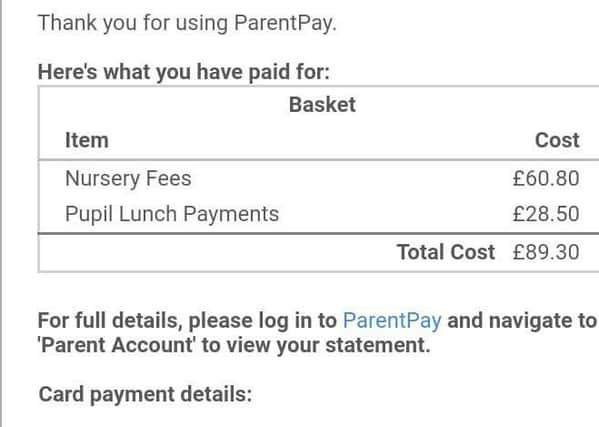Special report: Fylde coast parents paying out of their own pocket for '˜free' childcare


Cash for dinners, extra-curricular activities such as football and yoga, and even breakfast clubs are now being asked of parents who are eligible for 30 hours of free care for their three to four-year-olds.
Nursery bosses spoke after a survey by the Pre-school Learning Alliance found two-thirds said government funding did not “cover the full hourly cost of delivering the places”.
Advertisement
Hide AdAdvertisement
Hide AdAnd a previous survey by the charity suggested just one third of nurseries were delivering its hours totally free.


One nursery owner, who has a string of businesses in the area, said charging parents for add-ons was “disgusting” and “greed”, though others said its a move taken to avoid losing money – and shutting down.
The county council said it receives £4.30 per hour per child from the Education and Skills Funding Agency (ESFA), which it pays back out to nurseries, while Blackpool Council could not confirm what it receives and pays out per hour.
With a staff-to-child ratio of 1:8 for three and four years olds, the owner, who did not want to be named, said nurseries can make hundreds of pounds profit every day – if they are full.
Advertisement
Hide AdAdvertisement
Hide Ad“The issue arises when you don’t have occupancy,” she said. “Maybe I just run very successful nurseries that are full all the time.”
She also said pre-schools can also suffer because they are only open 9am until 3pm during term-time.
“They are struggling with their business plan,” she said. “What business can survive on 38 weeks of the year and being closed the rest of the time?”
She described the government’s offering, which she said works out at around 20 hours a week for nurseries that are also open out-of-term, as “wonderful for families” and added: “It’s really helped women get back to work after their maternity leave.
Advertisement
Hide AdAdvertisement
Hide Ad“The nurseries that say they are struggling are just looking at their profit margins. No nurseries [here] have an hourly rate more than what the council is paying.
“Down south it’s very different and in cities like Leeds it’s different because their hourly rate is a lot more, but Lancashire is generous with its rates.”
Suzanne Baker, who owns the outstanding-rated Treetops Nursery in Carlin Gate, North Shore, said she also thinks charging additional fees is “greed”, and added: “I don’t think there’s any need for it whatsoever.
“I wouldn’t want to be in the position where a child is sat there watching another child taking part in an activity.
Advertisement
Hide AdAdvertisement
Hide Ad“People will probably say they are doing it out of necessity, but unless you are doing really badly there’s no need for a top-up fee in my opinion.
“I would say it’s a bigger problem in areas like the South East, where they charge significantly more.”
However, Suzanne did say some nurseries with a higher proportion of children in receipt of free hours, which are spread over 38 weeks of the year, may struggle to cover costs during the school holidays when youngsters are off.
Another manager, at a nursery in Wyre, said the government grants do not cover rising costs, with the National Living Wage going up to £7.83 per hour in April, with pension contributions, food, and other costs also increasing.
Advertisement
Hide AdAdvertisement
Hide Ad“A nursery near us says its hours are nine until four, and if you want earlier or later you pay extra per hour,” she said.
“Then you pay for dinner. Some parents are paying £20 to £30 a day.”
Not all nurseries charge extra, though the practice is thought to be increasingly common.
They cannot charge for the ‘free’ 30 hours of childcare, but they are able to demand a fee for food, nappies and wipes, and trips, though parents “must be offered alternative options to paying any fees”, a spokeswoman for the Department for Education said.
Advertisement
Hide AdAdvertisement
Hide AdMost working parents in England have been entitled to free childcare – during term-times – since last September. They are “usually” eligible if they are in work, on parental leave, sick leave, or annual leave, and earning at least minimum wage, the government said.
The Pre-school Learning Alliance’s survey, of 1,662 nurseries and childminders and carried out between July 17 and August 23, revealed 46 per cent felt the scheme “had a negative financial impact” on their business.
There were 45 childcare providers in Blackpool at the end of March, with 2,275 places – or 26.8 for every 100 children up the age of four.
That’s one of the lowest figures in the north west, where the average was 34.
Advertisement
Hide AdAdvertisement
Hide AdIn the past year, six nurseries have closed, and three have opened, with a net loss of 14 places, statistics showed.
Neil Leitch, chief executive of the Pre-school Learning Alliance, said: “The fact is even those providers who are technically managing to make the 30 hours work are often only able to do so by introducing or increasing additional fees and charges.
“Is this what the government meant when they promised parents 30 hours of ‘free childcare’? And while better-off parents may be able to shoulder these unexpected costs in the short-term, those on the lower end of the income scale – the families that the government claims to be so committed to supporting – are the ones who are likely to suffer as a result.
“Worse still, things are only going to get more difficult, with early years funding levels frozen until 2020 despite the fact that provider business costs like wages, mortgages and rents will inevitably rise over this time.
Advertisement
Hide AdAdvertisement
Hide Ad“How many increasingly expensive ‘additional costs’ will providers be forced to introduce, how many providers will be forced to close their doors, before government admits there’s a problem?
“The inescapable fact is that, as these figures show, without urgent action, the 30 hours policy is simply not viable in the long term.”
Forty-five per cent of parents receiving 30 free hours said they have been asked for extra fees for non-funded hours, a poll by Mumsnet – of 1,143 parents with three and four year olds – found recently.
And 41 per cent had been asked to pay for new or additional charges.
Advertisement
Hide AdAdvertisement
Hide AdA Department for Education spokesman said: “More than 340,000 children have benefited from a 30 hours place in its first year, as childcare providers have risen to the challenge of delivering the offer – meaning that thousands of hardworking parents are saving up to £5,000 a year on their childcare bills.
“We are spending more than any other government on childcare support with £1 billion extra funding a year to deliver all of this government’s free childcare offers. We continue to monitor delivery costs and we have commissioned new research to provide further information on the costs around childcare.”